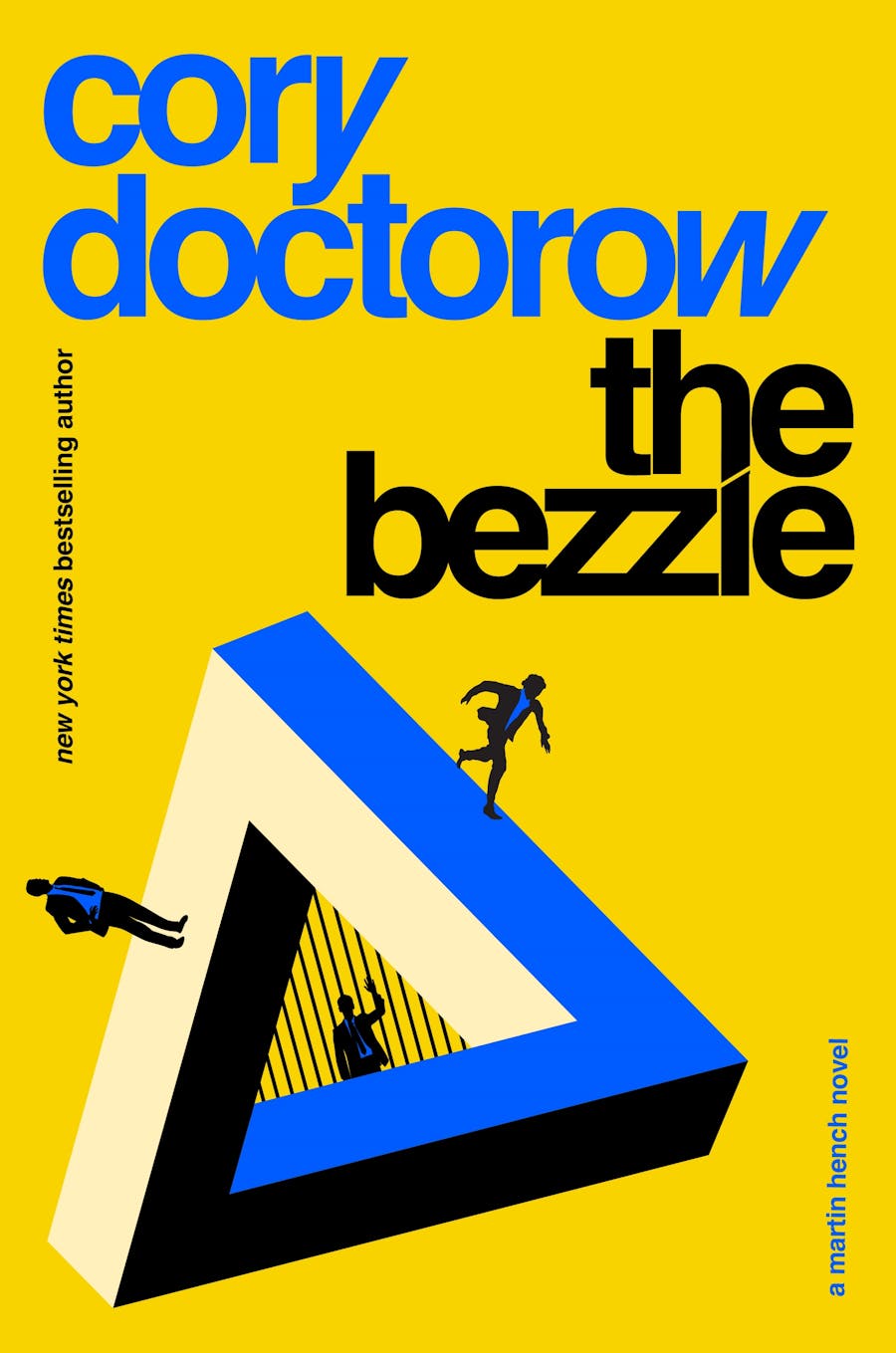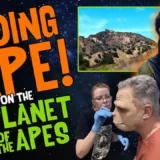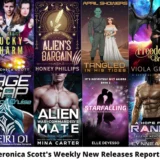 Part One
Part One
There’s No Crime In Avalon
How do I know so much about prisons? No, I wasn’t ever locked up—I mean, jail, sure, if you manage to live as long as I do without pissing off some small-town Deputy Dawg so much that he sticks you in the pokey overnight, you’re not living. But I was never incarcerated in a state or federal facility.
But yes, I know a lot about prisons.
It’s a long story.
I mean long.
Look, it’s a beautiful night. We could just listen to the owls hunt the furry critters. Or we could push our sleeping pads together. It’s a warm night.
Okay, I’ll tell the story. But remember, you asked to hear it.
Yes, it’s a fraud story. They’re all fraud stories. But at least this one doesn’t have anything to do with cryptocurrency. This one’s from decades before that business. This is from the Mesozoic era,
the second great era of high-tech scams.
Yes, I mean the dot-com bubble. Yes, I know you were there, too. But you were working for a big, serious company. You didn’t see the churn and the froth. Why, I bet you’ve never even heard of CabCandi.
Yeah, “CabCandi.” Like “taxi” and “junk food.” It’s exactly what it sounds like.
They raised seven million bucks.
1
Avalon is a chocolate-box town on an enchanted island, twenty-two miles from the Port of Los Angeles. Catalina Island: the redoubt of the Wrigley chewing-gum fortune, acquired by William Wrigley Jr. in 1919, and developed as the chic spot for Hollywood’s smart set.
For years, starlets, leading men, producers, and directors plied the channel on wooden ships out of Long Beach, drinking cocktails on the three-hour crossing, vomiting discreetly over the railings.
They caroused at Old Man Wrigley’s “Casino”: the largest building on the island, a twelve-story art deco roundhouse with a ground-floor cinema with its own pipe organ, and, above it, the largest ballroom in the USA, known to a glamour-hungry nation as the source of a weekly broadcast live from “high atop the Casino on beautiful Catalina Island.”
The one thing the Casino didn’t have? Gambling. Wrigley fancied himself a sophisticate, and his casino took its name from the Italian word for “gathering place.” The fact that this confused everyone who visited, for the rest of time, only reinforced Wrigley’s superiority.
There was no gambling at the Catalina Casino, because gambling leads to crime, and there’s no crime in Avalon. That’s what the tourist brochures tell you. It’s what the four thousand year round locals tell you. It’s what the two-thousand-odd beautiful people who own summer homes on the island tell you. If you’re one of the members of the thirty-five-thousand-strong July Fourth weekend crowd, you’ll come home and tell it to your friends.
There’s no crime in Avalon.
* * *
Scott Warms brought me to Avalon in 2006, one year after he sold InterPoly to Yahoo! and became a millionaire at twenty-three. Scott had been forced into the sale by his investors, and I’d helped him, a little, untangling their creative accounting so he didn’t get crammed at the sale time and lose the equity he’d bargained hard for at twenty-one, when he founded the company.
Scott didn’t want to work at Yahoo!, and truth be told, Yahoo! didn’t want Scott working there. But Scott’s Yahoo! shares wouldn’t fully vest for three more years. He was already a millionaire, but if he hung in—or got fired—he’d be a decimillionaire. Corollary: if he quit, he’d lose tens of millions of dollars. At twenty-three years of age, three years felt like an eternity to Scott, but he had plans for those remaining millions—$20 mil if Yahoo!’s share price held, maybe more if it went up.
So Scott and Yahoo! were playing chicken. He wanted them to fire him, but not for cause, and so he became an expert on California employment law—Scott could become an expert on any subject in six months. California employment law only took him two. He made sure that he engaged in precisely as much fuckery as the law allowed and not one nanogram more.
Which is how he ended up on Avalon. Scott was formally a vice president, as was typical for the CEOs of the dozens of companies Yahoo! bought with billions pumped into it by SoftBank’s Masayoshi Son. That meant that he was entitled to five weeks of paid vacation every year, which no Yahoo! exec came close to taking. Not even the French ones.
Scott took every single day he was entitled to. Twenty-five days of paid leave translated into 12.5 four-day weekends per year. Add in federal and state holidays and sick days, and that number went up to twenty-four four-day weekends per year. Then there were the conferences, off-sites, and team-building retreats, at least one of those every month, and then the time off in lieu of the travel days and overnights, and Scott was taking thirty-two short weeks per year, plus two weeks at Christmas.
He was entitled to a plush office, which he generously allowed other teams to book as a meeting room or getaway space, because it was so often empty. Scott liked microbrewed beer, and his grateful coworkers often brought by a bottle of something they’d taken home from a brewpub or made in their garage, and they’d put it in his grocery-store-style glass-door refrigerator with a post-it of thanks and tasting notes.
Scott was part of an executive committee that was supposed to evaluate possible acquisition targets, companies like InterPoly. The only times Scott came close to quitting Yahoo! and forfeiting his $20 mil were when a really promising start-up came through the door. The combination of a smart founder and a great product made Scott pine for all the time he was wasting. Even worse was his dreadful knowledge that if he gave an honest assessment of the start-up he’d just heard pitched, he’d trap some other naïf like him in the Yahoo! quicksand.
He had a good nose for this stuff, and he’d use the preliminary documents to schedule his long weekends, making sure he was in town and present only for meetings where they were hearing from stupid companies making stupid products. He found it physically painful to sit through their pitches without tongue-flaying their founders. But at least he could honestly sit down with the rest of the committee afterward and recommend that the company stay the hell away from the wretched start-ups they’d heard from that day. Generally, the committee would all agree with him.
The sole exception was CabCandi, a start-up that wanted to fill taxi drivers’ trunks with candy and use a web-based dispatch to turn major metros’ cabdrivers into a circulating snack-delivery service for hungry stoners. Scott correctly pointed out that this was a profoundly stupid idea. The other committee members pointed out that CabCandi had much better fundamentals than its rivals, the successors to Kozmo.com. Scott replied that Kozmo had collapsed and the post-Kozmo stoner-snack dot-coms would do no better. The committee overrode his objections and offered a term sheet to CabCandi, $7 million on $12 million, pre-money. But they were outbid by Battery Ventures, who offered $9 on $14.
After CabCandi, Scott decided to use one of his sick days and go to Avalon, and he invited me down for the long weekend.
“Fly into Long Beach, Marty, and we’ll chopper over.” He was deliberately breezy, clearly wanting to impress me. I’d been in helicopters. They’re noisy. But Scott was as eager as a puppy and he just wanted me to have a good time.
“It’s a date,” I said. “Let me check Expedia for flights from Oakland.”
“Southwest is your best bet. They’re not on Expedia, and they’ve got a website that doesn’t suck.”
It didn’t suck, which was quite an accomplishment for an airline, to be frank. I caught the 5:15 and we touched down in Long Beach at 6:07, four minutes ahead of schedule. Scott met me at the baggage carousel, bouncing on his toes with excitement.
“Marty Fuckin’ Hench!” He grabbed me in a big hug. He was still ninety-eight pounds soaking wet, tall and bony. He’d gotten rid of his ponytail and gotten a millionaire’s haircut, something that transformed his cheekbones and prominent teeth from skull-like to aquiline, and he’d replaced his crooked wire-rim glasses with a pair of aviators with clear lenses, which was a statement, though I couldn’t tell you what it was trying to say.
He released me from the hug. “Scott Fucking Warms,” I replied. “You’re looking good.” Sky-blue Hugo Boss blazer with turned-up cuffs, striped shiny lining, and orange satin accents at the slash pockets; obligatory Japanese denim as stiff as cardboard; some kind of designer sandals that looked like something Salvador Dalí would put on Jesus’ feet.
“I’m so, so, so glad you came, buddy. Catalina is crazy, like nowhere I’ve been before. They’ve got bison. Oh, here are the bags!” There’d only been eight people on my flight, and only four bags spilled onto the belt. I grabbed for mine, but Scott got it before me and shot the handle. “Come on!” He took off for the private airfield.
I followed him out the door and into the cool, sea-scented Long Beach night, across a couple of crosswalks and then up to a gate where a private security guard checked his ID and mine against a list on his screen.
I was just a forty-something forensic accountant back then, with a good line in unwinding high-tech scams, and I was far from a rich man, but I’d flown private a few times—sometimes clients claim they can only fit in a meeting on their bizjet—but I didn’t see the attraction, not then, when it just convinced me that I was working for someone with more dollars than sense, and not much later in life, when a big score set me up with enough money to fly private any time I want.
I keep waiting for the day when private fliers are subject to even one percent of the indignities of a TSA checkpoint, but every time I fly, it’s the same. I could have brought a wheelie-bag full of C-4 and packing nails through that checkpoint and they wouldn’t have known about it.
I sure hoped no one mentioned this to Osama bin Laden.
The helicopter was waiting for us, Scott’s bag already aboard. We climbed in using the little running board, and the pilot—a grey-hair with the bearing of an ex-military pilot gone to fat—welcomed us aboard and showed us to our headphones, giant earmuffs with curly-cable umbilici that plugged into armrest one-eighth-inch jacks, reminding me of my old high-school hi-fi set. Once we snapped into our five-point harnesses and opened our complimentary mineral waters, Scott toggled some switches on an overhead panel and we were on a channel with the pilot.
“We’re all ready, Captain,” he said.
“Roger that,” the pilot said in perfect air force monotone.
“Going private now, Captain,” Scott said.
The pilot gave us a thumbs-up and kicked in the engines and my whole skeleton began to buzz with the chopper’s roar. We lifted off and Scott let out a whoop! and drummed his thighs.
“Oh, buddy, I can’t tell you how bad I needed this,” he said. “And it’s so good to see you.”
“It’s good to see you too, Scott. How’s life in the punctuation factory?” That’s what we called Yahoo!, in tribute to that asinine exclamation point.
“Don’t ask. Let’s talk about this weekend instead. Normally I stay at a friend’s place; there’s about a half dozen people I know with summer places there and they’ve all got guest rooms, but I thought it might be awkward for you to crash with a stranger, so I booked us rooms at the Zane Grey Hotel.”
“As in the author?” Zane Grey pretty much invented the cowboy novel. My old man had dozens of his books and would always circle the TV Guide listings for the movie adaptations—there were more than a hundred of them, and he loved every one, but insisted that none of them came close to the books.
“Yeah! It’s his old house! He built a summer place there, old Pueblo style, and just kept adding on to it every time he got a fat check. It’s a hotel now. Gorgeous. I got us the penthouse. Four balconies, a patio, harbor views.”
Maybe I made a face. My business did just fine. The dot-com bubble had sucked in billions for every harebrained scheme you could imagine, and some of that money disappeared into creative spreadsheets. Hardly a month went by without my being called upon to find a couple of million that had been made to disappear through a black hole in one of those spreadsheet cells. My take was 25 percent of whatever I recovered, and I recovered a lot. But even so, I didn’t have punctuation factory money. This Zane Grey place sounded pricey.
“It’s on me,” he said. “My invitation, my tab. I insist. I’ve wanted to stay at this place since I first laid eyes on it. Man, I can’t wait.”
We were high over the channel now. The deepest channel off any coast, anywhere. It’s a crime scene. There’s no crime in Avalon, but just offshore?
That channel is the final resting place of tens of thousands of barrels of DDT, dumped there by Montrose Chemical in steel that was thoroughly, utterly incapable of maintaining its integrity at the bottom of a three-thousand-foot saltwater channel.
Down in those depths, there’s crimes whose perps belong in front of the International Court of Justice for crimes against humanity.
The sun was just setting, right in our eyes, the Pacific-blue sky turning the color of fresh blood, then dried blood, and then—that flash of green, just as the sun dipped over the horizon.
“There it is!” Scott pointed and bounced a little in his seat. From the air, Catalina Island was a rugged Mediterranean hillscape with a picture-postcard seaside village nestled in its little harbor, where ranked yachts bobbed and a ferry backed and filled to turn around. The towering Casino anchored the town to the right: a cream-colored squat cylinder topped with a dark rice-paddy hat of a roof whose red-brick color flared in the last rays of the sun. To the left, the harbor turned into a beach road that girded a cliff. We banked that way and there was the helipad, lit up with spotlights.
The pilot angled us in, leveled off, and sank down, both skids kissing the ground at the same moment. A couple of ground crew in hi-viz ran out to tie us down, and then the pilot unbuckled, stepped into the passenger area, and opened the door, stretching out his arm in an “after you” gesture. We stepped out into the Catalina night.
***
Cory Doctorow is a science fiction author, activist, and journalist. His latest book is THE LOST CAUSE, a solarpunk science fiction novel of hope amidst the climate emergency. His most recent nonfiction book is THE INTERNET CON: HOW TO SEIZE THE MEANS OF COMPUTATION, a Big Tech disassembly manual. Last April, he published RED TEAM BLUES, a technothriller about finance crime. He is the author of the international young adult LITTLE BROTHER series. He is also the author of CHOKEPOINT CAPITALISM (with Rebecca Giblin), about creative labor markets and monopoly; HOW TO DESTROY SURVEILLANCE CAPITALISM, nonfiction about conspiracies and monopolies; and of RADICALIZED and WALKAWAY, science fiction for adults, a YA graphic novel called IN REAL LIFE; and other young adult novels like PIRATE CINEMA. His first picture book was POESY THE MONSTER SLAYER (Aug 2020). His next novel is THE BEZZLE (February 2024). He maintains a daily blog at Pluralistic.net. He works for the Electronic Frontier Foundation, is a MIT Media Lab Research Affiliate, is a Visiting Professor of Computer Science at Open University, a Visiting Professor of Practice at the University of North Carolina’s School of Library and Information Science and co-founded the UK Open Rights Group. Born in Toronto, Canada, he now lives in Los Angeles. In 2020, he was inducted into the Canadian Science Fiction and Fantasy Hall of Fame. In 2022, he earned the Sir Arthur Clarke Imagination in Service to Society Awardee for lifetime achievement. York University (Canada) made him an Honourary Doctor of Laws; and the Open University (UK) made him an Honourary Doctor of Computer Science.
Kermit is an omnicompetent individual who grew up in a former bawdy house before relocating to his state’s capital city. His family includes many talented artists and an uncle who founded The Church of Bigfoot. He has a passion for storytelling often exploring new ways to engage audiences.










